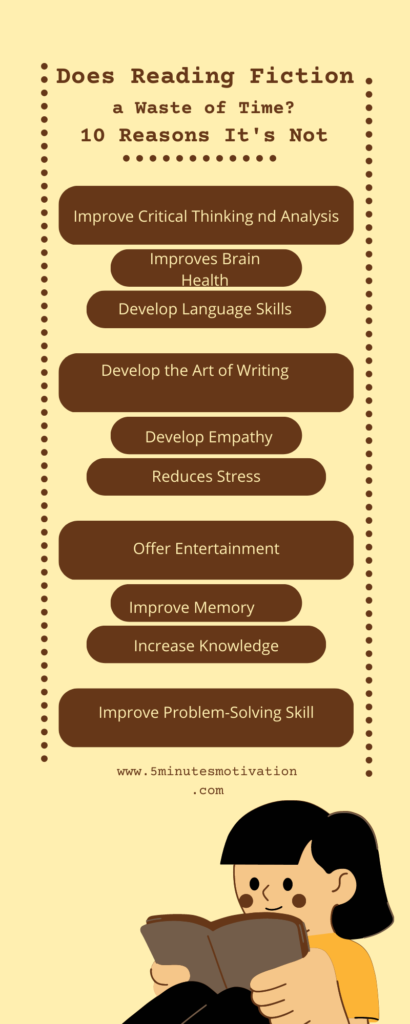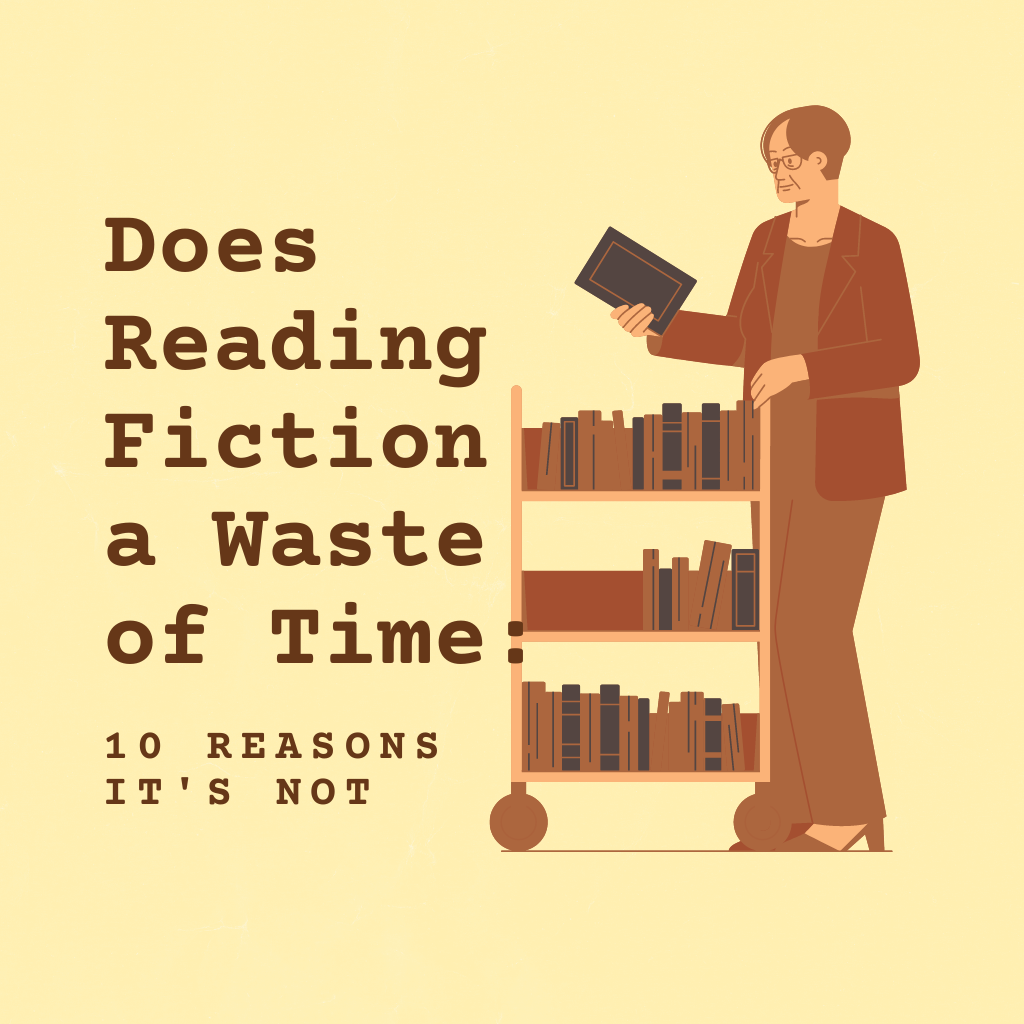Does reading unreal stories, situations, and characters worth your time? Are there any benefits to reading fiction? Is reading fiction bad for you?
People need clarification about whether reading fiction is a waste of time or valuable reading.
Is reading fiction a waste of time? It is not. General surveys, academic research, and people’s opinions stress that reading fiction is not a waste of time. It develops empathy, improves critical thinking and problem-solving skills, reveals Stress, provides enjoyment and improves knowledge and memory. Reading fiction also improves writing skills.
The lessons of fiction books differ from non-fiction books, but both are important. Every fiction is not useful, just like every non-fiction book. You should select a fiction book carefully. Much trash is present in fiction genera, making the whole genera doubtful.
How Many People Read Fiction?
- In a survey in the UK, 50.3% of girls read fiction aged 8 to 18 in 2015.
- According to a survey in 2020, 54.7% of children and young people read printed fiction books at least once per month.
- National Endowment for the Arts 2009 states that 87% of book readers read fiction
States on the Benefits of Reading Fiction
- There is a 20% reduction in the mortality who read books compared to non-readers.
- According to research by Yale University School of Public Health, reading books 30 min a day showed a survival advantage and increased our lifespan.
- Book reading offers a stronger survival advantage than reading newspapers and magazines.
- Research provides evidence that legendary reading fiction develops empathy.
- Your Brain on Fiction, an article published in the New York Times in March 2012, provides evidence that reading fiction or stories stimulates the brain and even changes the way of acting.
- Reading fiction can reduce stress levels by up to 68% because we get lost in books and focus on reading books. Fiction books are the greater hookers of attention than non-fiction books.

Benefits of Reading Fiction
1: Improves Brain Health
- A study from the University of Sussex states that reading fiction reduces Stress rather than going for a walk, listening to music, and drinking coffee.
- As well as reading for 6 minutes is sufficient to reduce stress levels by 60%, slow heartbeat, ease muscle tension, and alter the state of mind.
- Reading before bed boosts the quality of sleep.
- A study of the Engagement in reading and hobbies and risk of incident dementia.
- The MoVIES Project in 2011 declared that “being engaged in more reading and hobby activities and spending more time each weak reading is associated with a lower subsequent risk of incident dementia.”
Participants were asked to read a fiction novel for 9 days in research. A significant increase in brain connectivity was observed during and after reading.
2: Improve Critical Thinking and Analysis
- Living the lives of many characters in fiction novels offers many lives to live, many situations to experience, and many challenges to tackle. It increases creativity. It provides a better understanding of how the character feels and thinks.
- The most important?
- It gives a deep understanding of situations. Most fiction readers are excellent observers and can deal with a situation with far more maturity due to their developed analytical skills.
3: Develop Language Skills
- Learning new words, phrases, and sentences is much easier in stories. You learn the word and how it is used in the context.
- A study by test vocab.com proves that reading builds our vocabulary, particularly fiction readers have a deep world understanding.
4: Develop empathy
- The fiction reading provides a better understanding of other people’s lives. Understanding other situations they are struggling with makes them more mature, caring, and compassionate.
- Research from Scientific America indicates that fiction improves empathy.
- A study in 2014 on the Changing Race Boundary Perception by Reading Narrative Fiction states that “Reading narrative fiction appears to ameliorate biased categorical and emotional perception of mixed race in individuals.”
- American author Ann Patchett once said, “Reading fiction gives us the ability to feel empathy for people we’ve never met, living lives we couldn’t possibly experience for ourselves because the book puts us inside the character’s skin.”
- In a survey, 62.5% of participants recommend reading fiction for better self-expression.
- Another study proved that reading fiction improves social-cognitive skills.
5: Develop the Art of Writing
- By reading fiction, you can improve your grammar skills, vocabulary, and comprehension. Furthermore, it contributes to writing skills on a professional level. Although all kinds of reading can improve writing abilities, reading fiction makes you able to write a far more interesting, heart-touching, and engaging context. Not reading fiction will make you a dry writer.
- Moreover, all great stories and contexts are inspired by another story. It is common to take many inspiring stories and create them into a new story. Reading fiction develops your style of writing even unconsciously.
- Reading the words of great writers is like learning from the great writers. So, reading fiction is very important if you want to be a writer, especially fiction.
6: Reduces Stress
- Fantasy, thriller, and humour greatly relieve stress (although temporarily). It forces your mind to shift gears and suck your attention by forgetting about your problems.
- Reading something hooked your attention goes beyond a mere distraction. It could enter you in an altered state of consciousness, taking your mind off your daily problems, at least for a little while!
- A study shows that reading fiction also helps to reduce anger.
7: Offer Entertainment
- You can travel the world, meet strangers, make friends, struggle with them, and learn from them just by opening a fiction book. Book is an inexpensive way of entertainment. A fiction book provides a free imagination and visualization in your head.
- In a survey, people claim that reading fiction keeps them from getting bored.
8: Improve Problem-Solving Skills
Is reading fiction good for your brain?
- One benefit of reading fiction is the development of problem-solving skills. In fiction books, many characters approach and solve their problems. When a person reads these books, he develops a mere skill of problem identification, problem approaches, and problem-solving. Fiction books offer to talk about real-life problems others are dealing with in diverse ways.
- It motivates you if you are struggling and will soon change the situation.
9: Improve Memory
- The interesting plot, profound characters, and stressed conditions make the story memorable. You recall the story in your head repeatedly from the stretch to predict the next scene.
- Many mystery novels have a small hint inside the plot, and you try hard to understand and memorize them as the story progresses.
- These scientifically proven memory exercises for better memorization can help us live improved and productive lives.
- Haskins Laboratories for the Science of the Spoken and Written Word conducted research which proved that reading newspapers, magazines, and any other text allows the mind to better process, understand, and recognize the message in enough time, unlike TV.
10: Increase Knowledge
- Although non-fiction books are a great source of knowledge, fiction books also provide a massive grade of knowledge. Fiction books provide massive knowledge about cultures, places, behaviors, and more.
- The quality and quantity of knowledge are indeed greater in non-fiction books. However, fiction books give a massive understanding of pity but important stuff.
However, some facts can’t be ignored here.
1: Consume lots of time
- Reading fiction consumes a lot of time than non-fiction. The length of novels and poetry books is doubled or tripled than the non-fiction books. Also, many fiction stories are published in the form of series. So, to fully cover and understand the story, you must read all the books in the series.
- The better option people consider is watching a movie based on the novel. But, indeed, movies must offer a deeper understanding of the character’s feelings, thoughts, and behaviors. In several important scenes, character identity and locations are compromised in the movie, providing comparatively less joy and satisfaction.
2: Imaginary world
- It is correct that all fiction is imaginary and has no reality (except some), especially fantasy novels. This intense imagination sometimes takes you away from the real world, problems, and real-life circumstances. Most of the life situations the characters live don’t exist.
- Some fiction stories may depend on real events. If the writing style, the story, and the character don’t fascinate and thought you, then it is hard to continue the story.
- But it is also obvious that sometimes tithe writer makes this imaginary world so fascinating and amazing, making you turn the pages repeatedly.
3: Immoral stories
- Erotic fiction books have a bad impact on the socially and individuals.
- However, a study in the Netherlands in 2018 declared that 50% of survey participants never read romantic fiction books, while 6% did so once a week or more.
The Conclusion
Hence it is clear that the benefit of reading is far more than its drawbacks. You can also become safe from the “bad fiction” if you want to be.
There is no need to compare reading fiction vs non-fiction, as both genera have their odds. Both are useful and harmful (to some expect). They can only overlap the other and provide the likelihood of a second one. Keep a balance between both.
Is reading fiction wither a waste of time or not? It merely depends on your choice.
If you select an erotic novel with bold scenes, you no longer benefit from it. Instead, if you choose a good novel with mature characters and a life-changing story, you will take advantage of it.
What do you think? Does all the scientific research satisfy your confusion?
Let us know in the comments below!

